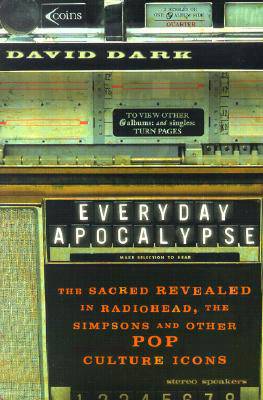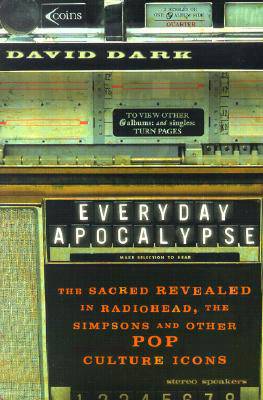
Door een staking bij bpost kan je online bestelling op dit moment iets langer onderweg zijn dan voorzien. Dringend iets nodig? Onze winkels ontvangen jou met open armen!
- Afhalen na 1 uur in een winkel met voorraad
- Gratis thuislevering in België vanaf € 30
- Ruim aanbod met 7 miljoen producten
Door een staking bij bpost kan je online bestelling op dit moment iets langer onderweg zijn dan voorzien. Dringend iets nodig? Onze winkels ontvangen jou met open armen!
- Afhalen na 1 uur in een winkel met voorraad
- Gratis thuislevering in België vanaf € 30
- Ruim aanbod met 7 miljoen producten
Zoeken
Everyday Apocalypse
The Sacred Revealed in Radiohead, the Simpsons, and Other Pop Culture Icons
David Dark
Paperback | Engels
€ 30,95
+ 61 punten
Omschrijving
The term "apocalypse" usually evokes images of mass destruction-burning buildings and nuclear fallout, or even rapture and tribulation. Often, our attempts to interpret the imagery of the book of Revelation seem to carry us far away from our day-to-day existence.
David Dark challenges this narrow understanding in Everyday Apocalypse, calling his readers back to the root of the word, which is "revelation." Through readings of Flannery O'Connor stories and savvy discussion of The Matrix themes, Dark calls us to imagine the apocalypse as a more watchful way of being in the world. He draws on the sometimes unlikely wisdom of popular culture-including The Simpsons and films like The Truman Show-to highlight how the imagination can expose our moral condition. Ultimately, Dark presents apocalypse as honest self-assessment and other-centeredness in the here and now.
This engaging book holds enormous appeal for readers interested in the pursuit of everyday spirituality. It will delight lovers of literature, popular music, and movies, as well as anyone concerned with a Christian response to popular culture.
David Dark challenges this narrow understanding in Everyday Apocalypse, calling his readers back to the root of the word, which is "revelation." Through readings of Flannery O'Connor stories and savvy discussion of The Matrix themes, Dark calls us to imagine the apocalypse as a more watchful way of being in the world. He draws on the sometimes unlikely wisdom of popular culture-including The Simpsons and films like The Truman Show-to highlight how the imagination can expose our moral condition. Ultimately, Dark presents apocalypse as honest self-assessment and other-centeredness in the here and now.
This engaging book holds enormous appeal for readers interested in the pursuit of everyday spirituality. It will delight lovers of literature, popular music, and movies, as well as anyone concerned with a Christian response to popular culture.
Specificaties
Betrokkenen
- Auteur(s):
- Uitgeverij:
Inhoud
- Aantal bladzijden:
- 160
- Taal:
- Engels
Eigenschappen
- Productcode (EAN):
- 9781587430558
- Verschijningsdatum:
- 1/12/2002
- Uitvoering:
- Paperback
- Formaat:
- Trade paperback (VS)
- Afmetingen:
- 152 mm x 233 mm
- Gewicht:
- 249 g

Alleen bij Standaard Boekhandel
+ 61 punten op je klantenkaart van Standaard Boekhandel
Beoordelingen
We publiceren alleen reviews die voldoen aan de voorwaarden voor reviews. Bekijk onze voorwaarden voor reviews.











